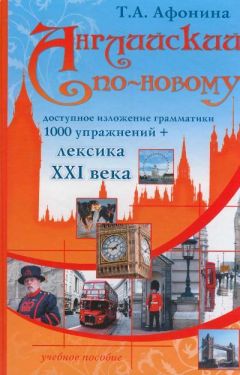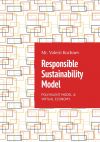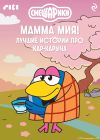Текст книги "Английский по-новому"

Автор книги: Татьяна Афонина
Жанр: Иностранные языки, Наука и Образование
сообщить о неприемлемом содержимом
Текущая страница: 5 (всего у книги 29 страниц) [доступный отрывок для чтения: 7 страниц]
Many, Much, A Lot of
(В отрицательных и вопросительных предложениях)
Many (много) употребляется с существительными множественного числа: many books много книг.
Much (много) употребляется с неисчисляемыми существительными: much money много денег.
Many и much употребляются преимущественно в отрицательных и вопросительных предложениях.
В утвердительных предложениях вместо many и much обычно употребляется a lot of.
I have a lot of friends. У меня много друзей.
Do I have many friends? У меня много друзей?
I don’t have many friends. У меня не много друзей.
He has a lot of experience. У него много опыта.
Does he have much experience? У него много опыта?
He doesn’t have much experience. У него не много опыта.
16.
Вставьте much, many или a lot of.
1. I have a lot of books at home. Do you have many books at home? – I don’t have many books at home.
We have a lot of coffee. Do you have much coffee? – We don’t have much coffee.
1. I have … friends. 2. Do we have … sugar? 3. We don’t have … time. 4. He is ready to spend … money on his children’s studies. 5. He has relatives. 6. Do you have … problems? 7. We don’t usually do … exercises in writing. 8. Do you usually drink … coffee? 9. She doesn’t usually put … sugar in her cup. 10. Our teacher usually gives us … marks at the lesson. 11. She doesn’t invite … students to the blackboard. 12. I don’t have … money now. 13. They don’t have … questions. 14. Do you have … time? 15. Give me a pen, please. You have got … pens. 16. Does she have … plants at home?
Со словами so, too, very, rather в утвердительных предложениях вместо a lot of употребляется much или many.
I have too many books at home. У меня дома слишком много книг.
He eats very much sugar. Он ест слишком много сахара.
He has rather bad marks. У него довольно плохие оценки.
They have so much time. У них так много времени.
17.
Замените a lot of на too, so, very much (many).
I have a lot of books at home. (so) → I have so many books at home.
The dog drinks a lot of water. (too) → The dog drinks too much water.
1. He has a lot of friends at work. (too) 2. I have a lot of coffee at home. (so) 3. They have a lot of good ideas. (very) 4. We have a lot of things to do. (rather) 5. She has a lot of sugar in the kitchen. (so) 6. You have a lot of bad marks. (too) 7. My friend has a lot of plants at home. (rather) 8. He has a lot of relatives. (so) 9. We have a lot of copy-books in our classroom. (too) 10. My father has a lot of documents on his table. (rather)
18.
Переведите английский язык.
1. У него много родственников? 2. У вас дома много книг? 3. У меня не много времени. 4. У нее много друзей? 5. У нас не много сахара. 6. У них много хороших идей. 7. У нас не много компьютеров в офисе. 8. У вас много комнатных растений дома? 9. У него не много чая. 10. На уроках английского языка мы делаем много упражнений. 11. У них не много вопросов. 12. Они обычно обсуждают много разных вопросов.
Much и a lot употребляются с глаголами как наречия меры и степени. Much употребляется, главным образом, в вопросительных и отрицательных предложениях. В утвердительных предложениях вместо much употребляется a lot.
He works a lot. Он много работает.
Does he work much? Он много работает?
He doesn’t work much. Он не много работает. (Он мало работает.)
Со словами so, too, very, rather в утвердительных предложениях вместо a lot употребляется much.
He works too (so, very, rather) much. Он работает слишком (так, очень, довольно) много.
How much does he work? Сколько он работает?
19.
Трансформируйте предложения по образцу.
He works a lot. → Does he work much? → He doesn’t work much.
He works too (so, very, rather) much.
1. He reads a lot. 2. She works a lot. 3. They study a lot. 4. We talk about art a lot. 5. You play the piano a lot. 6. She respects him a lot. 7. They play jokes on him a lot. 8. We help her a lot.
Неопределенные местоимения some и any (Indefinite Pronouns Some and Any)
Рассмотрим два случая употребления неопределенных местоимений some и any и некоторых их производных (somebody, someone, something, anybody, anyone, anything) в утвердительных, вопросительных и отрицательных предложениях.
Первый случай
Some и any означают «некоторое количество, немного». Употребляются с неисчисляемыми существительными и существительными множественного числа, причем some употребляется в утвердительных предложениях, а any – в вопросительных (общих вопросах) и отрицательных.
I have some money. У меня есть немного денег.
Do you have any money? У вас есть немного денег?
I don’t have any money. У меня нет денег.
He has some pens. У него есть несколько ручек.
Does he have any pens? У него есть несколько ручек?
He doesn’t have any pens. У него нет ручек.
I see somebody. Я вижу кого-то.
Do you see anybody? Вы кого-либо видите?
I don’t see anybody. Я никого не вижу.
20.
Трансформируйте предложения по образцу.
We have some tea. → Do we have any tea? – We don’t have any tea. – We have no tea.
1. He has some butter on his piece of bread. 2. My colleague has some friends. 3. They have some questions to discuss. 4. She wants to put some sugar into her coffee. 5. I have some friends abroad. 6. We see some plants in our classroom. 7. She has some English books at home. 8. We usually do some exercises in writing at our English lessons.
21.
Трансформируйте предложения по образцу.
I see somebody in the street. → Do you see anybody in the street? – I don’t see anybody in the street. – I see nobody in the street.
1. She wants to say something. 2. We (often) discuss something interesting at our English lessons. 3. I want to eat something. 4. The dog feels somebody. 5. He (often) speaks to someone on the phone. (по телефону) 6. Our teacher calls somebody to the blackboard every lesson. 7. He invites somebody to his home every day. 8. She puts something down into her diary (дневник) every evening. 9. They know something. 10. I like to read something when I have dinner.
22.
Трансформируйте предложения по образцу.
Somebody gives her good advice. → Does anybody give her good advice? – Nobody gives her good advice.
1. Somebody helps her to take care of her children. 2. Something is poured into your cup. 3. Somebody knows her name. 4. Somebody visits my neighbour every evening. 5. Someone takes care of this cat. 6. Someone lives here. 7. Somebody pays for their studies. 8. Something is written here.
Some (а не any) употребляется:
– в вопросительных предложениях, если они по сути являются просьбой, на которую ожидается положительная реакция
Do you want some tea? Вы хотите чаю?
– при образовании специальных вопросов с сохранением значения несколько, некоторое количество.
Why don’t you want to discuss some questions with him? Почему вы не хотите обсудить некоторые вопросы с ним?
23
Вставьте some или any.
1. Do you want to have … (немного) coffee? 2. Does he want … (немного) cake? 3. Do you want…(немного) money? 4. Do they want…(немного) butter? 5. Can I take … (немного) of your time? 6. Can I trust you with…(некоторый) information? 7. Who drinks … (немного) tea every day? 8. Why don’t you want to answer … (несколько) questions? 9. Where can he introduce her to … (некоторыми) important people?
Второй случай
Some означает «некоторым, какой-то, некий».
We don’t have similar views on some problems. У нас нет сходных взглядов на некоторые проблемы.
Any означает «любой, какой-нибудь, какой-либо, никакой».
Ask any student. Спроси любого студента.
В этих значениях some и any употребляются с любыми существительными в любых предложениях (с исчисляемыми и неисчисляемыми существительными в утвердительных, вопросительных и отрицательных предложениях.
Any и его производные нередко употребляются в предложениях с if.
If you have any questions ask your teacher. Если у вас есть вопросы, спросите вашего преподавателя.
24
Вставьте some или any.
1. Call me at … (любой) time. 2. Take … (любой) pen, you want. 3. Have … (любой) CD. 4 … (любой) student knows this. 5. Buy … (любая вещь) you want for him. 6. If you want to ask … (что-то, что-л.), do it. 7 … (любой) film in English is good for them. 8. We don’t have similar views on … (некоторый) problems. 9. It doesn’t take me long to get to … (некоторый) of my relatives. 10. It is not difficult to put questions to … (некоторым) of these sentences. 11. Do you often visit … (некоторых) of your friends? 12. Does the English teacher often give bad marks to … (некоторым) of your students?
25.
Переведите на английский язык.
1. Вы хотите немного чаю? 2. Дайте мне какую-нибудь книгу. 3. Звоните в любое время. 4. У нас разные взгляды на некоторые проблемы. 5. Она хочет положить немного сахара в свой кофе. 6. Я не хочу (никакого) масла. 7. Если вам нужна (какая-либо, какая-то) помощь, обратитесь к Смирнову. 8. Никогда не давайте ему никаких денег! 9. У вас есть какая-нибудь идея (idea)? 10. У вас есть (немного) кофе? 11. Здесь кто-нибудь живет? 12. Кто-нибудь знает ее адрес? 13. Вы что-нибудь хотите?
Модальные глаголы Can и Must (Modal Verbs Can and Must)
Глагол can означает физическую или умственную способность сделать что-либо, а также наличие обстоятельств, позволяющих совершить какое-либо действие.
I can swim. – Я умею (могу) плавать.
После глагола следует инфинитив без частицы to. Вопросительные и отрицательные предложения с can образуются без вспомогательных глаголов.
Can не изменяется по лицам и числам. Этот глагол употребляется со всеми тремя моделями: be, do, be done.
He can be attentive. Он умеет (может) быть внимательным.
Can he be attentive? Он умеет (может) быть внимательным?
He can’t (cannot) be attentive. Он не умеет (не может) быть внимательным.
I can answer your question. Я могу ответить на ваш вопрос.
Can you answer my question? Вы можете ответить на мой вопрос?
I can’t (cannot) answer your question. Я не могу ответить на ваш вопрос.
The bath-tub can be filled with water. Ванну можно наполнить водой.
Can the bath-tub be filled with water? Ванну можно наполнить водой?
The bath-tub can’t (cannot) be filled with water. Ванну нельзя наполнить водой.
26.
Составьте предложения с can по образцу.
to be responsible (she) → She can be responsible.
to answer your question (he) → He can answer your question.
to be filled with water (the bath-tub) → The bath-tub can be filled with water.
1. to write the sentence on the blackboard (she); 2. to keep his handwriting straight (he); 3. to put different types of questions to the sentence (we); 4. to ask questions on the text (they); 5. to be attentive (you); 6. to follow his advice (I); 7. to look at the exercise (you); 8. to do the exercise himself (he); 9. to translate the sentence from English into Russian (she); 10. to be prepared for him (the towel); 11. to be laid for breakfast (the table); 12. to be ground (the coffee); 13. to be packed (the bag); 14. to be ironed (the shirt); 15. to be cleaned (the trousers); 16. to be sliced (the bread).
27.
Трансформируйте предложения по образцу.
I can say something about Smirnov. → Can you say anything about Smirnov? – I can’t say anything about Smirnov.
1. She can look after your children. 2. He can play the piano well. 3. We can help her. 4. I can say, we are all good friends. 5. You can introduce her to him. 6. We can work for this firm. 7. She can take care of it. 8. They can pay for your studies. 9. You can get a good education here. 10. He can spend a lot of money on books. 11. We can play a joke on him. 12. I can discuss important questions with her. 13. You can trust him. 14. She can rely on you. 15. The question can be answered. 16. The sentence can be translated. 17. The table can be laid for breakfast. 18. The exercise can be done right in the textbook. 19. The problem can be discussed. 20. The money can be spent on books.
28.
Переведите на английский язык.
1. Вы можете мне помочь? 2. Я могу ответить на ваш вопрос. 3. Я не могу поставить вопрос к этому предложению. 4. Он может быть внимательным, когда делает домашнюю работу? 5. Она может присмотреть за вашими детьми. 6. Мы не можем навещать ее каждый день. 7. Я не могу доверять вам. 8. Вы можете представить меня ее маме? 9. Эти деньги можно потратить (могут быть потрачены) на учебники. 10. Эту ванну можно наполнить (может быть наполнена) водой. 11. Теперь тетради можно собрать (могут быть собраны). 12. Этот вопрос можно обсудить сегодня (может быть обсужден). 13. К предложению можно поставить (может быть поставлен) вопрос этого типа. 14. Вашу контрольную работу невозможно прочитать (Работа не может быть прочитана).
29.
Ответьте на вопросы по образцу.
Can we drink some coffee? (no coffee) → No, we can’t drink any coffee because we have no coffee.
1. Can I see Mr. Smith? (no; abroad) 2. Can you put a question to this sentence? (yes; know the rules) 3. Can we visit her? (yes; know where she lives) 4. Can she translate this sentence from Russian into English? (no; doesn’t know the words) 5. Can he discuss this question with you now? (no; no time) 6. Can you buy him a present? (no; no money) 7. Can we trust her? (yes; responsible) 8. Can he give us good advice? (yes; experienced) 9. Can we talk with him about music and art? (yes; well-educated) 10. Can you give me this book? (no; not mine)
Глагол MUST означает приказ или необходимость (долженствование) совершить какое-либо действие.
You must know it. Ты должен это знать.
После глагола следует инфинитив без частицы to. Вопросительные и отрицательные предложения с must образуются без вспомогательного глагола.
Must не изменяется по лицам и числам.
Этот глагол употребляется во всех трех моделях: be, do, be done. В качестве отрицательного ответа на вопрос с must используется отрицательное предложение с needn’t.
He must be at home. Он должен быть дома.
Must he be at home. Он должен быть дома?
He needn’t be at home. Ему не нужно быть дома.
She must write it. Она должна это написать.
Must she write it? Она должна это написать?
She needn’t write it. Ей не нужно это писать.
The work must be done. Работа должна быть сделана.
Must the work be done? Работа должна быть сделана?
The work needn’t be done. Работу не нужно делать.
Отрицательное предложение с must не является отрицательным ответом на вопрос с must, а означает запрет делать что-либо.
You musn’t be rude. Не смей грубить.
30.
Составьте предложения с must по образцу.
to be attentive (you) → You must be attentive.
to come at 9 o’clock (you) → You must come at nine o’clock.
to be done (the work) →– The work must be done.
1. to write the correct date on the blackboard (she) 2. be attentive (you) 3. to follow the rule (we) 4. to do the exercise in writing (they) 5. to get good marks (we) 6. to be patient (the teacher) 7. to take care of one’s children (parents) 8. to help your mother (you) 9. to be written (the exercise) 10. to be done (the homework) 11. to be prepared (the towel) 12. to be discussed (the question) 13. to be spent (the money) 14. to be polished (the shoes) 15. to be ironed (the shirt)
31.
Трансформируйте предложения по образцу.
You must be here at five o’clock. → Must I be here at five o’clock? – No, you needn’t.
You must do this work. → Must I do this work? – No, you needn’t.
The sentence must be translated. → Must the sentence be translated? – No, it needn’t.
1. You must read this text. 2. He must come here at five o’clock. 3. We must do this exercise orally. 4. She must follow the advice. 5. They must be careful. 6. You must introduce her to him. 7. He must pay for it. 8. She must take care of this document. 9. I must discuss this question with you. 10. The problem must be discussed. 11. The text must be read. 12. The work must be done. 13. The exercise must be written. 14. The question must be answered.
32.
Переведите на русский язык.
1. You mustn’t say that. 2. You mustn’t write in ink in your textbook. 3. He mustn’t take this money. 4. She mustn’t follow this advice. It is bad. 5. They mustn’t play jokes on their younger brother. 6. You mustn’t get bad marks. 7. This money mustn’t be spent. 8. This question mustn’t be discussed now. 9. These documents mustn’t be signed.
33.
Переведите на английский язык.
1. Вы должны быть ответственными. 2. Должен ли я быть здесь в 7 часов? (Мне нужно быть здесь в 7 часов?) – Нет, не нужно. 3. Ее отец тратит много денег на ее учебу. Она должна учиться хорошо. 4. Мы должны следовать правилам. 5. Должен ли он следовать вашему совету? – Нет, ему не нужно это делать. 6. Они должны быть очень внимательными, когда делают домашнюю работу. 7. Это контрольная работа. Вам нельзя открывать учебники и списывать (copy) слова. 8. (Вам) нельзя писать ручкой в учебниках. Они не ваши. 9. Эти деньги тратить нельзя.
34.
Ответьте на вопросы по образцу.
Must I say it? (Yes, important)– Must I say it? – Yes, you must. It is important.
Must I do it in writing? (No, orally) → Must I do it in writing? – No, you needn’t. Do it orally.
1. Must we discuss this question now? (Yes, important) 2. Must I answer this question? (No, not important) 3. Must she look after this child? (No, Granny takes care of him) 4. Must he do this exercise? (No, not his homework) 5. Must these sentences be translated? (Yes, your test) 6. Must I invite him? (No, not your friend) 7. Must Tom be very attentive at the lesson? (Yes, wants to get a good mark) 8. Must she sign this document? (Yes, head of our department) 9. Must he come to college every day? (Yes, a first-year student)
Be Able to и Have to
В некоторых случаях вместо can и must используются, соответственно, эквиваленты be able to и have to. Значение be able to (быть способным) близко к значению can (мочь). Be able to употребляется вместо can:
• для обозначения однократной удачи, «везения» или персональной способности говорящего произвести какое-либо действие.
• вместо недостающих форм глагола can.
Значение have to «быть вынужденным сделать что-либо под давлением обстоятельств» несколько отличается от значения must «быть обязанным (с)делать что-либо под давлением моральных обязательств».
Parents must take care of their children. – Родители должны заботиться о своих детях (моральные обязательства).
I have to do this exercise in writing. – Я должен (мне нужно) сделать это упражнение письменно (давление обстоятельств).
Have to употребляется вместо недостающих форм глагола must.



35.
Трансформируйте, где возможно, предложения по образцу.
I can do this work. → I am able to do this work.
He must learn this text by heart. → He has to learn this text by heart.
1. He can be very friendly. 2. She can be very attentive. 3. They can put different types of questions to this sentence. 4. This question can be discussed with him. 5. His studies can be paid for. 6. You must be responsible. 7. I must go. 8. She must do her homework. 9. The document must be signed. 10. The text must be translated.
36.
Поставьте к предложениям вопросы всех изученных типов.
1. She is able to do this work very quickly. 2. They are able to translate this text themselves. 3. You have to be more attentive at the English lessons. 4. They are not on good terms but he has to be friendly to her. 5. I have to learn a lot of English words every day. 6. We have to do a lot of exercises in writing. 7. This text has to be translated. 8. This problem has to be discussed.
37.
Переведите на английский язык, используя must, have to, can, be able. Объясните ваш выбор.
1. Мне приходится ходить туда каждый день. (Мне нужно…) 2. Ему приходится быть очень внимательным на уроках английского языка, чтобы не получать плохие оценки. 3. Он не способен выучить этот текст наизусть. 4. Вы умеете (можете) играть на пианино? 5. Вы можете поговорить с ним об искусстве? 6. Мы должны ему помочь. (Это наш долг.) 7. Мне часто приходится помогать ему. 8. Мы должны заботиться о своих пожилых родителях. 9. Я должен ответить на эти вопросы письменно. 10. Не помогай ему! Он способен сделать это сам!
38.
Ответьте на вопросы по образцу.
Are you able to answer this question? (Yes, know how to answer.)
Yes, I am able to answer this question, because I know how to answer it.)
1. Does she have to pay for her son’s studies? (No, his father pays.) 2. Do I have to discuss this question with you now? (Yes, you have time.) 3. Are you able to translate this sentence from English into Russian? (No, don’t know the words.) 4. Is he able to put different types of questions to this sentence? (No, doesn’t know the rules.) 5. Do we have to put it down? (Yes, important.) 6. Is she able to look after this child? (Yes, doesn’t have to work, runs the house.) 7. Does he have to read this text? (Yes, his home task.) 8. Do these documents have to be signed? (No, not important.)

После глаголов want, try, prefer, have, need следует инфинитив с частицей to:
want to do хотеть сделать
try to do стараться сделать
prefer to do предпочитать делать
have to do быть вынужденным сделать (под давлением обстоятельств)
need to do иметь надобность, потребность что-л. сделать
39.
Переведите на русский язык.
1. I want to say some words about my friend. 2. I always try to keep my handwriting straight. 3. I prefer to have a hot shower in the morning. 4. He has to learn a lot of English words every day. 5. She needs to have some strong coffee. 6. Do you want to introduce him to me? 7. Why do you always try to play a joke on me? 8. Whom do you prefer to discuss these questions with? 9. Why do you have to take care of this child? 10. What do you need to say? 11. I don’t want to rely on him. 12. Don’t even try to spend this money. 13. Try not to get a bad mark. 14. He prefers not to trust her with his secrets. 15. We don’t have to pay for his studies. 16. He doesn’t need to introduce her to them.
40.
Вставьте to.
1. I want … write this word on the blackboard. 2. We need … ask you a question. 3. They have … put different types of questions to this sentence. 4. She always tries … get good marks. 5. He prefers … translate these sentences in writing. 6. You don’t need … open your text-books. 7. He doesn’t have … do this exercise in writing. 8. She doesn’t even try … help him. 9. I don’t want … iron your shirt. Do it yourself! 10. We prefer not … follow this advice. 11. Do you want … look at it? 12. Do we really need … take it? 13. Does she have … look after her sister’s child? 14. Doesn’t he try … be attentive? 15. Don’t you prefer … spend this money on books?
41.
Вставьте соответствующие формы глаголов.
1. He (want, say) … some words about his friend. 2. I always (try, keep) … my handwriting straight. 3. She (prefer, have) … a hot shower in the morning. 4. He (have, learn) … a lot of English words every day. 5. She (need, have) … some strong coffee. 6. Do you (want, introduce) … him to me? 7. Why do you always (try, play) … a joke on me? 8. Whom do you (prefer, discuss) … these questions with? 9. Who (have, take care) … of this child? 10. How much money does he (need, get)…? 11. I don’t (want, rely) … on him. 12. Don’t even (try, spend) … this money. 13. (Try, not, get) … a bad mark. 14. He (prefer, not, trust) … her with his secrets. 15. We don’t (have, pay) … for his studies. 16. He doesn’t (need, introduce) … her to them.
42.
Переведите на английский язык.
1. Мне часто приходится обсуждать разные вопросы с моими коллегами. – Мне не приходится (не нужно) учить много английских слов каждый день. 2. Ей приходится помогать своим родителям. (Ей нужно помогать родителям) – Ей не приходится (не нужно) платить за обучение. 3. Ему приходится много работать. (Ему нужно много работать.) – Ему не приходится много работать. 4. Им приходится заботиться о своих сестрах. (…) – Им не приходится (нет нужды) тратить на это много денег. 5. Нам приходится учить английский язык. – Нам не приходится помогать ей. 6. Он предпочитает потратить свои деньги на это. – Он предпочитает не тратить свои деньги на это. 7. Я предпочитаю обсудить этот вопрос с начальником. – Я предпочитаю не обсуждать этот вопрос. 8. Она предпочитает сделать это упражнение устно. – Она предпочитает не делать этого. 9. Мы предпочитаем не спрашивать его об этом. Мы предпочитаем последовать вашему совету. 10. Они предпочитают подписать этот договор (contract). – Они предпочитают не подписывать этот документ (document). 11. Я хочу накрыть на стол. – Я не хочу ссориться с тобой. 12. Он хочет рассказать (tell) вам о своем друге. – Он не хочет рассказывать вам о своем друге. 13. Мы хотим оказать им любезность. – Мы не хотим оказывать им любезности. 14. Они всегда пытаются помочь нам. – Они никогда не пытаются помочь ему. 15. Он всегда пытается подшутить над ней. – Он даже не пытается навестить ее. 16. Нам нужно поговорить. – Им не нужно обсуждать этот вопрос. 17. Мне нужно позаботиться об этом. – Вам не нужно (нет нужды) оказывать ему любезность. 18. Мне надо выучить текст наизусть. – Вам не надо ему звонить. 19. Ему приходится заботиться о своей сестре? 20. О чем она предпочитает разговаривать? 21. Кто хочет заплатить за это? 22. Он всегда пытается помогать ей? 23. Что вам нужно?
43.
Ответьте на вопросы, используя подсказки в скобках.
Why does everybody respect him? (responsible, patient, hard-working)
Everybody respects him because he is responsible, patient, hard-working.
1. Do you want to say a few words about Tom? (Yes, my friend) 2. Why does he prefer to discuss it with you? (experienced, know the question well) 3. Who wants to get a good education? (My sister, know much about her work) 4. Do you need to see him? (Yes, discuss an important question) 5. Why does she have to visit her Granny so often? (old, needs help) 6. Why do you try to be attentive at your English classes? (want to study English) 7. You have to translate these sentences, do you? (Yes, homework) 8. Who tries to study well? (Tom, father pays for his studies) 9. Why don’t you try to ask the teacher? (angry with me) 10. You prefer to put it down, do you? (Yes, important).
Сложное дополнение с Want (The Complex Object With Want)
После ряда глаголов в действительном залоге употребляется оборот «объектный падеж с инфинитивом», представляющий собой сочетание личного местоимения в объектном падеже или существительного в общем падеже с инфинитивом. В предложении этот оборот играет роль сложного дополнения.

I want him to be attentive. Я хочу, чтобы он был внимательным.
Tom wants us to help him. Том хочет, чтобы мы помогли ему.
Ann wants this agreement (to be) signed. Анна хочет, чтобы этот договор подписали (был подписан).
44.
Переведите на русский язык. Выполните обратный перевод.
1. I want to be attentive. I want you to be attentive. 2. He doesn’t want to be angry. He doesn’t want her to be angry. 3. We don’t want to be nervous. We don’t want him to be nervous. 4. She wants to be careful. She wants him to be careful. 5. Mr. Evans wants to be hard-working. Mr. Evans wants his son to be hard-working. 6. The Browns don’t want to be lazy. The Browns don’t want their daughter to be lazy. 7. All parents want to be patient. All parents want their children’s teachers to be patient. 8. I want to be well-brought up. I want my child to be well brought up. 9. Smirnov wants to be well-educated. Smirnov wants his daughter to be well-educated. 10. I want to go to the blackboard. I want you to go to the blackboard. 11. She wants to ask him a question. She wants them to ask him a question. 12. They want to answer their questions. They want us to answer their questions. 13. He wants to follow her advice. He wants her to follow his advice. 14. We don’t want to look at this thing. We don’t want you to look at this thing. 15. We don’t want to open the books at page 7. We don’t want them to open their books at page 7. 16. I don’t want to be sent to Spain. I don’t want him to be sent to Spain. 17. Does she want to be introduced to us? Does she want him to be introduced to us? 18. He wants to be respected. He wants her to be respected. 19. I want the bath-tub (to be) filled with water. 20. He wants his towel (to be) prepared for him. 21. She wants the table (to be) laid for breakfast. 22. We want the coffee (to be) ground. 23. They want the bread (to be) sliced. 24. Mr. Brown wants some milk (to be) poured into his cup. 25. Denis doesn’t want his bread (to be) buttered. 26. Elizabeth doesn’t want her bed (to be) covered with this bedspread. 27. Do you want your shoes (to be) polished? 28. Does he want his shirt (to be) ironed? 29. Does she want her bed (to be) made?
45.
Вставьте, где нужно, to.
1. I … want … you … turn … to page 12. 2. He … wants … us … read … the text. 3. Their … teacher … wants … them … do this exercise orally. 4. We … want … him … tick … the right answers. 5. She … doesn’t … want … us … write in ink in our textbooks. 6. I … want … him … draw the margin. 7. He … wants … her … be … happy. 8. Mr. Evans … doesn’t … want … us … write in the margin. 9. She … wants … them … leave … the margin free for marking. 10. Our … teacher … wants … us … hand in our homework.
46.
Поставьте местоимения и существительные в соответствующей форме. Обратите внимание на то, что, в отличие от местоимений, существительные своей формы не меняют.
I want (she) to follow my advice. → I want her to follow my advice.
I want (the boy) to follow my advice. → I want the boy to follow my advice.
1. The teacher wants (I) to collect the copybooks. 2. He wants (she) to translate this sentence from English into Russian. 3. I don’t want (you) to be nervous. 4. She wants (her children) to be hard-working. 5. We don’t want (our students) to be lazy. 6. They want (we) to help them. 7. Do you want (he) to visit you? 8. Does he want (they) to study at university? 9. Do they want (it) (to be) done? 10. Does she want (her daughter) to be a nurse at a hospital? 11. Don’t you want (Ann) to go to Spain? 12. Don’t they want (their parents) to live in London? 13. Do you want (I) to come to the blackboard? 14. Does their teacher want (they) to do the exercise right in their textbooks? 15. Don’t parents want (their children) to be happy?
47.
Трансформируйте предложения по образцу.
I want you to marry her. (he) → He wants you to marry her.
1. I want you to run the house. (he) 2. We want you to look after the children. (she) 3. They want her to play the piano. (he) 4. You want this exercise (to be) done. (she) 5. I want her to play the piano. (he) 6. We want you to go by car. (she) 7. They don’t want her to go on foot. (he) 8. You want him to try to help her. (she) 9. I don’t want you to say anything. (he) 10. We want him to introduce them to her mother. (she) 11. Do they









































